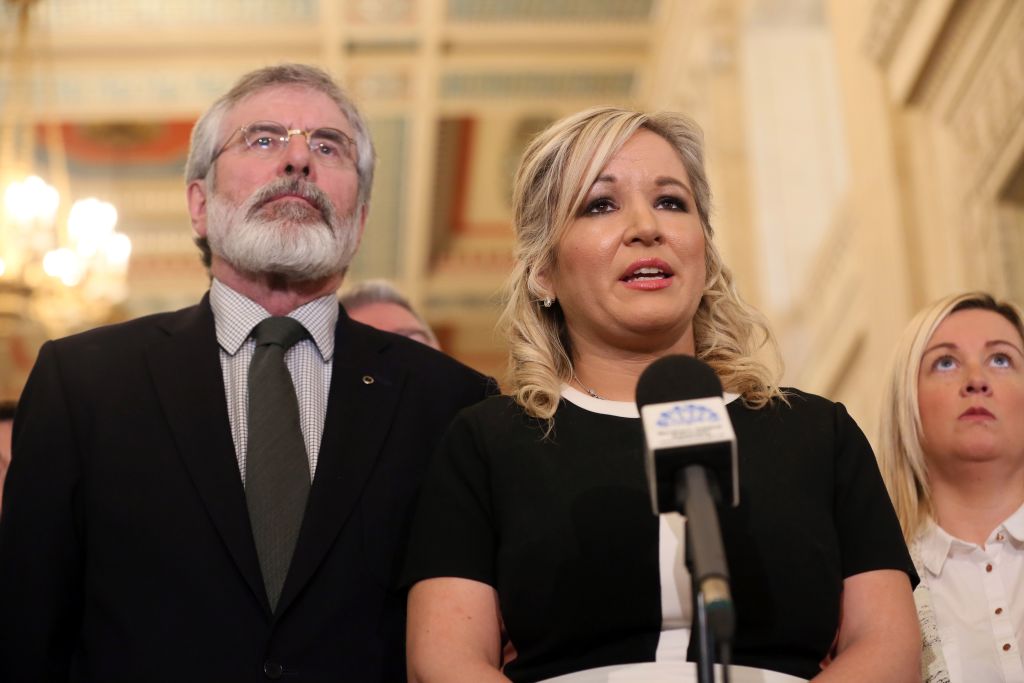Predictably – and understandably – the Northern Ireland Office’s proposed amnesty for crimes relating to the Troubles has resulted in a backlash across both sides of the Ulster divide. Yet, while the criticism was initially uniform, rifts have already emerged in the week since they were first unveiled.
The noble ideal that justice delayed is justice denied has proved relatively feeble as a unifying glue, despite the Northern Ireland Assembly voting on Tuesday for a motion rejecting Westminster’s proposals. Prior to that vote, which heard many heartfelt and worthy speeches from across the chamber about the moral and legal basis for rejecting the amnesty, a gathering took place outside the Stormont chamber to protest the proposals.
The protest was attended by various members of the Sinn Fein glitterati including Gerry Kelly, who was jailed for his part in bombing the Old Bailey in 1973 and who shot a prison officer in the head during a subsequently successful escape from Maze prison a decade later. Slogans such as ‘no amnesty for British state forces’ were banded about by those in attendance. The deputy First Minister, Michelle O’Neill, enthusiastically tweeted that ‘there can be no amnesty for those who murdered citizens on the streets of Ireland and for those who directed them.’
Sinn Fein’s fundamental lack of honesty makes finding solutions to the legacy issue even more challenging
This was yet another galling stunt from Sinn Fein, the political wing of an organisation which created countless victims during the Troubles. Kelly himself was one of the 365 who received royal pardons from 1979 to 2002, illustrating the fundamental hypocrisy at the heart of Sinn Fein’s approach to the issue of legacy. No wonder the prominent victims campaigner Ann Travers – the daughter of a Catholic judge who saw her sister killed by the IRA during an attempted assassination of their father as they left mass in 1984 – said she felt sickened by what she saw.
Sinn Fein’s boldness has largely been encouraged by the behaviour of various British governments. This is a natural end to a process that has seen royal pardons, post-Belfast Agreement prisoner releases and so-called ‘on the run letters’ – effective assurances for terrorists that they will not be prosecuted. Small wonder that Sinn Fein take such a selective approach to legacy given they have disproportionately benefited from a lack of bite in Westminster and the prioritisation of the much feted ‘process’ in Northern Ireland.
This fundamental lack of honesty makes having a mature conversation about solutions to the legacy issue even more challenging, especially when Sinn Fein are attempting to take ownership of the process. It was no surprise that the Ulster Unionists and Alliance Party refused to attend a party leaders’ forum earlier this week led by Sinn Fein’s Mary Lou McDonald, after the party’s southern leader said she would use her chairmanship of the meeting to discuss legacy.
McDonald herself has said previously that the IRA campaign was a justified one. Despite the tantric bending of reality so typical of Northern Irish politics, neither she nor anyone else within her party can be regarded as an honest broker when it comes to fighting the amnesty and defending basic notions of justice and accountability for crimes committed.
The loyalist blogger Jamie Bryson tellingly said in his response to the legacy proposals that ‘if I were to be really honest, I’d quite like an amnesty for loyalists and the security forces, but I’d never support it for the IRA. Nationalists probably feel the opposite.’
Though not a view universally held on either side, it emphasises the difficulty those who prioritise fair and equitable justice for all victims face when elements of both sides enter discussions with a maximalist interpretation of the justness of their respective cause. This will in all likelihood strangle at birth any moves to marshal a locally-led campaign against what Westminster is preparing to impose.
Sinn Fein’s posturing in recent days will undoubtedly put many people off this worthwhile cause but for it to succeed, that cannot be allowed to happen. If Michelle O’Neill is steadfast in her view that ‘there can be no amnesty for those who murdered citizens on the streets of Ireland and for those who directed them,’ will she be bold enough to have that conversation with prominent members of and supporters of her own party?






Comments